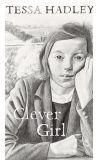
02 May 2013 02:46:24
Clever Girl begins in the early 1960s, when the narrator Stella (born in 1956, like Hadley herself) is a child living in Bristol with her single mother, and ends in 2006, when she is a married woman of 50 with three children, reconnecting to her past. In her childhood and youth, she remembers, "so many things that seem quaint now were current and powerful … shame, and secrecy, and the fear that other people would worm their way into your weaknesses". In the details as well as the events of Stella's narrative, Hadley dwells on the secret, shameful lives of girls and women, and "the dark, sticky, mucky centre" of femaleness. Girls "practise huddling in the school playground", while male superiority in the public, pub-like world seems unquestionable and unassailable, "mahogany-coloured" and "tobacco-smelling".
Growing up, Stella's thrilling discovery of her intelligence, "like a sensation of divinity", is abruptly halted by her discovery of sexuality and by a disgraceful teenage pregnancy. Defying her mother and stepfather, longing for a life of books and art, she tells them that "I would die if my life turned out as boring and narrow" as theirs. Of course, fate, or at least the fate of women, mocks her aspirations and arranges things differently, as her mother had warned: "Boring or not, you'll have to get on with it, like everyone else."
Stella's trajectory, while violent and dramatic in some respects, is overall familiar as the narrative of a clever girl growing up in the provinces. For most of the book, she presents herself in terms of what she is reading, following the traditional pattern of novels about women who find the template of their own lives in books. Loving Edwardian family fiction as a child, Stella progresses from The Forsyte Saga in her early teens to an infatuation with Beckett and Burroughs as a would-be aesthete in love with an androgynous boy, and then to a prolonged absence from reading when "the whole plan for my life changed track".
Many years later, she tells the reader, "the Victorians saved me", and she immerses herself in Victorian fiction from East Lynne to Middlemarch, "with its ideals of womanly sacrifice and goodness". At the age of 30 Stella finally goes to university, and even begins a PhD in English literature.
So far, about two-thirds of the way through, the story of a clever girl seems coherent. Even if some themes in the early chapters fade away (for example, the pagan tree cult she invents with her best friend at school), Stella seems like a knowable character. She's akin to the kind of bookish, introspective female figure exemplified by Jane Gray, the heroine of Margaret Drabble's 1972 novel The Waterfall, who muses "those fictional heroines, how they haunt me".
And then Hadley introduces an unexpected shift: Stella quite suddenly decides she does not want to study literature, let alone get a PhD. "I was grateful to the university," she announces; "it had made all the difference to me and had been the gateway into my new intellectual life; but now I chafed inside its frame."
Instead she becomes an occupational therapist. A what? Where did this rather prosaic decision come from? Such drastic career changes certainly occur in life, but in a novel, where the reader counts on an accumulation of details to build up the inner life of a character, this last-minute switch seems arbitrary, capricious and unproductive. It might be justified if occupational therapy led Stella to self-discovery or a sense of fulfilment, but instead it seems to negate or undermine her literary past.
That abrupt shift is the major reason Clever Girl doesn't add up. Constructing a novel out of linked, consecutive short stories offers the writer opportunities to benefit from epiphany and liminality, to create spaces between stories in which characters can change and grow in new directions. To meet the needs and expectations of the reader, however, epiphany must also come with narrative responsibility.

